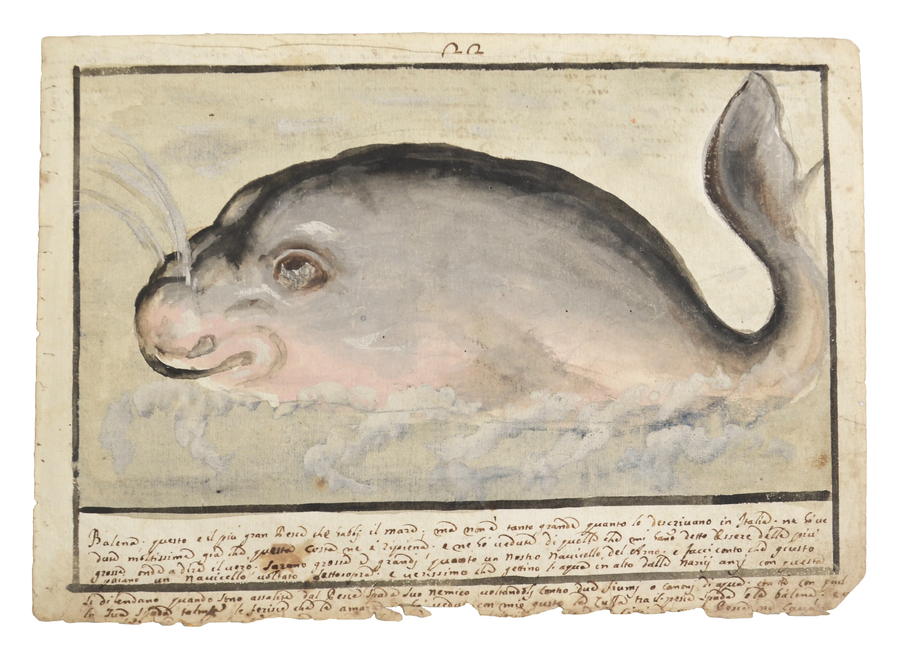PW022: Whale
Balena; questo e il piu gran Pesce che habbi il mare; ma non é tanto grande quanto lo descrivano in Italia. ne hó vedute moltissime gia che questa costa ne é ripiena; e ne hó vedute di quelle che mi han[n]o detto Essere delle più grosse onde a dire il verò; Sarano grosse e grandi quanto un nostro navicello del Arno e facci conto che giusto paiano un navicello voltato sottosopra; e verissimo che gettino l’aqua in alto dalle narici anzi con questa si defendano quando sono assalite dal Pesce Spada suo nemico voltandoli contro due fiumi o canoni di aqua; con t[u]tto con quella sua spada talmte le ferisce che le ama[. . .]; io ho vedu[to] con mio gusto la Zuffa tra il pesce spada e la balena e [-------] [verso]
mantenimento e mangiare p[er] i schiavi; e ne cavano moltissimo Olio che qua serve p[er] ardere e p[er] fare Acatrame havendo il Sig: Id: proveduto che non essendovi olivi in Terra vi siano Olivi in mare, la caccia o Pescha delle Balene principia p[er] S: Ant: e dura t[u]tto Ottobre non si fà qui ma a Tapariga nel Brazile; il modo di piglarle é mirabile ma molto pericoloso &: quelli ossi di Balena che vengano costà1 delli quali ne fan[n]o l’Imbusti le Sig:e Don[n]e sono le gorgie della Balena; dicono che si alimenti di sardine; tenendone una quantita grande nelle d: gorgie e ingolandone una p[er] volta; il verò è e quuello [sic] che si vede che ha la gola strettissima benché habbi la bocca tanto grande e sia una Bestia smisurata; onde bisogna dire che quella che inghiottì Giona fossi miracolosa
Whale; this is the largest fish the sea has; but it is not as big as they describe it in Italy; I have seen very many because this coast is full of them; and I have seen the ones that they told me were the largest hence to tell the truth; they are maybe as big and tall as one of our boats of the Arno and imagine that they look just as a boat turned upside down; it is very true that they throw water in the air from their nostrils in fact with this they defend themselves when they are attacked by their enemy the swordfish turning towards them two rivers or canons of water; in all with its sword it wounds it is so much that it [kills] it; I have seen with pleasure the battle between the swordfish and the whale; and [. . . missing line]
[verso] subsistence and food for the slaves; and they get from it a lot of oil that serves here for burning and to make tar having God Our Lord provided that not being olives in the land there would be olives at sea. The hunt or fishing of the whales starts on [the Feast of] Saint Anthony and lasts all of October. It is not done here but in Tapariga in Brazil; the way to catch them is remarkable but very perilous etc. these bones of Whale that go there where you are [costá] with which the Ladies make corsets are the throats of the whale; they say that they eat sardines; holding a great quantity of them in said throat and swallowing them one at a time, the truth is that what you can see that is that they have a very narrow throat in spite of having such as large mouth and being an immense beast; hence it must be said that the one that swallowed Jonas would be miraculous
- 1Costá is a locative adverb that refers to the location of the person whom the speaker or writer is addressing in Florentine dialect. In this case it indicates that the writer addressed someone in Italy from afar, in this case, central Africa.

Add new comment